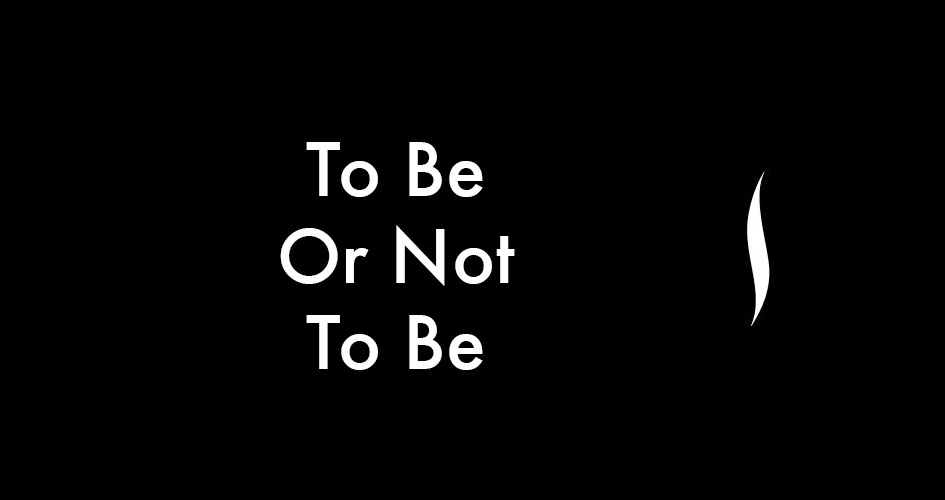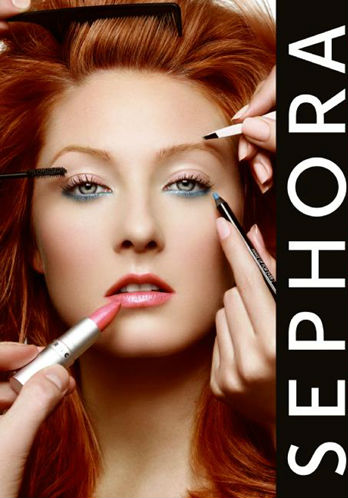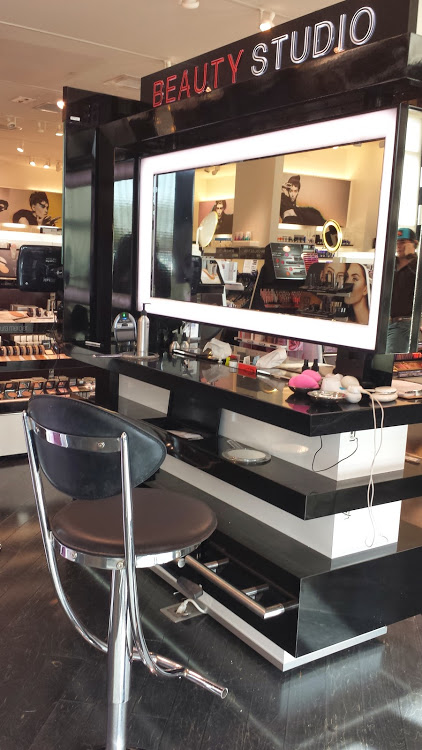 |
 |
| Another aspect that Sephora includes in its store is the makeup studio presented as the "Beauty Studio" which also incorporates the technology of layout. The makeup studio is used when customers either need to get their makeup done for a special occasion or for when they're at the store shopping and trying out products. This makeup studio is comprised of a table that has a mirror standing on it and on the table are the different utensils to apply the makeup. Right next to the table is a chair for the subject to sit on. The technology of layout is used in how this studio is set up right in the middle of the store. It has a built in relationship with the products and brands surrounding it. The brands that are chosen to surround the studio are based on their sales performance. The brands that have the highest and the lowest are placed there for those respective reasons. If a brand is a top seller they have it stationed near the studio because not only is it a brand that is trusted and a product that is already liked but they want to maintain its sales. They also have the brands that are on the lower end of the sales spectrum so that its sales are increased. |
| When a visitor is getting his or her makeup done the first thing that happens is that this subject is now placed into a chair. By having the subject placed on the chair this subject is being submitted to their discourse and loose control. The makeup artist now has the control and is able to tell them in a subconscious way what they like and need. The social construct of the employee being knowledgeable about the products gives them this power, "Moreover, salespeople supply vital information to customers, and the salesperson's ability to communicate information is one of the most important facets of the buyer seller exchange process. Salespeople obtain valuable information from the customer, but in order to serve as experts, salespeople must be able to assimilate and leverage this information in the context of context of their own product/service offering" (Hughes 16). The make up artist does this is by getting the products that are situated nearby so that the subject is forced into trying the product. Since the makeup artists is seen as someone that knows about makeup because they are hired by the store. It is believed they are hired mostly for their expertise and knowledge about makeup. This visitor has a preconception that when they tell a customer what to use or what looks good on them, the customer will more than likely believe them because they are hired by Sephora, and go by the assumption that they wouldn't be hired by Sephora if they didn't know a thing or two about make up. |  |
|||||||||||||||||||||||||||||||||||||||||||||||||||
 |
Since Sephora operates as "open sell", the customer has access to the products allowing the "beauty studio" to operate. What happens is that "Open sell, by putting the products out front and letting women examine and try them, changed the nature of the relationship. It put the customer in charge and turned the sales associate into her makeup pal." (Winter 37). With positioning the makeup artist physically equal to the customer, there is more openness to relying on the makeup artists. It creates a comfort zone for the customer allowing the makeup artist the ability to possibly be able to persuade the customer when they go to the beauty studio to try on the products. By sitting on the chair, the customer has non verbally stated that they want to be made up and look their best, because it is implied that makeup creates this beauty. They are placing an importance to the use of makeup because they are subjecting themselves to be persuaded by what is deemed a higher authority. Since the the makeup artists hold the power of persuading the customer by the choices they make on which products they will use on the subject, they use their knowledge to promote those products that are not doing so well. This results in a setting where the makeup artists knows the sales of the different products and brands but the subject has no idea on whether it's a "hot" product or if it's one that's lacking sales. If the subject likes the product the probability of the subject now buying the object increases.The proximity of the brands to the makeup studio, allow for the makeup artists to create a relationship of want from the subject towards these objects. Since these brands are situated nearby the makeup studio, it creates easy access for the makeup artists to reach these products and be able to use them on the person that has given this makeup artists the control to choose a product that that he or she might be beneficial to the person sitting on the chair. This power is one that can be considered risky. Since the product that makeup artist chooses is based off of his or her own personal preference or whatever they feel needs to sell or want to promote the customer probably isn't getting the best product available. |
| Another aspect that comes into play is that this object is chosen by the makeup artists with a subjective idea. This makeup artists might find this product to be best fitting or feel that said products looks great on the customer when in reality it might not look all that great and there is also the probability that there could be a better fitting product in the store. That is why it is problematic for the makeup artist to be given the full authority they are given by the customer. Once the customer gives up their authority and allows for the makeup artists to chose the makeup for them they are losing their identity. By allowing external influences to alter their makeup, Goldstein's argument becomes invalid: "Thus we can say that makeup was already seen as something proffered to be read, something already understood as constructing a public self which might, or might not, accurately reflect a private self"(Goldstein 147). Many women describe using makeup to reflect their personality. Several women were interviewed in regards to makeup many stated a belief that "Women learn that not just any looks is good but that they need to find the look that is good for them. That is, makeup and looks have to reflect the self" (Beausoleil pg. 51). What the beauty studio does is remove the customers ability to reflect their self by what makeup is being applied and how it's being applied. They are subjecting their makeup application and products to what the makeup artist believes is best. Giving in not only to someone else's ideal look but also giving into society's concept of the ideal use of makeup and quite possibly idea of beauty as well. |
| Hughes, Douglas, Joël Bon, and Adam Rapp. "Gaining And Leveraging Customer-Based Competitive Intelligence: The Pivotal Role Of Social Capital And Salesperson Adaptive Selling Skills." Journal Of The Academy Of Marketing Science 41.1 (2013): 91-110. Communication & Mass Media Complete. Web. 24 Apr. 2014. | Beausoleil, Natalie. Many Mirrors: Body Image and Social Relations. Ed. Nicole Landry. Sault. New Brunswick, NJ: Rutgers UP, 1994. Print. | Goldstein, Judith L. "The Female Aesthetic Community." Poetics Today 14.1 (1993): 143-63. JSTOR. Web. 30 Apr. 2014. | thisthatbeauty.com |